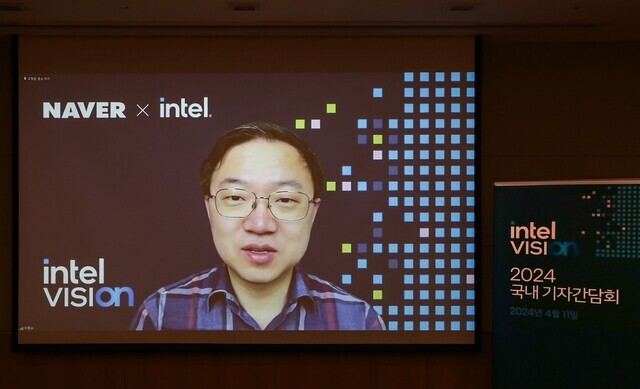hankyoreh
Links to other country sites 다른 나라 사이트 링크
Korea’s Naver teams up with Intel to challenge Nvidia’s AI monopoly

Now that Intel and Naver have made their collaboration on artificial intelligence official, all eyes are on whether their alliance will prove fruitful. The two companies plan to build their own AI ecosystem based on Intel chips to counter Nvidia’s monopoly in the AI chip market. Seeing how Nvidia dominates the AI market in both hardware and software, it seems that their battle will be an uphill one.
Intel Korea, the South Korean branch of the tech company, held a roundtable with Naver Cloud in Yeouido, Seoul, on Thursday to announce their collaboration. Naver Cloud, a subsidiary of the major portal site Naver, will develop software related to large language models (LLM) based on Intel’s chips.
The focus of the alliance is to unsettle Nvidia’s monopoly in the AI chip market. Most AI developers have been using Nvidia’s programming platform CUDA, but both CUDA and the software developed with it are virtually exclusive to Nvidia chips, making them Nvidia-dependent.
Nvidia’s strategy has been to create a closed ecosystem, locking in customers and strengthening its market dominance. Nvidia’s share of the AI chip market is estimated to be north of 90 percent.
Intel and Naver Cloud are working with South Korean universities and startups to build their own software infrastructure. Instead of relying on Nvidia, they will develop software based on Intel’s AI accelerator Gaudi 2, and the results will be released as open source. Intel will provide the Gaudi chips, while Naver Cloud will lead the research.
Naver hopes this will help the company grow its presence in the AI ecosystem while reducing its reliance on big-budget Nvidia chips, as Intel’s chips are known to be significantly cheaper than Nvidia’s.
“This alliance is significant,” said Lee Dong-soo, who oversees AI semiconductor strategy at Naver Cloud, “because, by trying to make domestically made software accessible and popular internationally, the two companies will be able to help people who use Gaudi and want to develop LLM in the future.”
However, there are a fair number of uncertainties surrounding how this joint venture will pan out. Not only are there questions about the research capacity of domestic companies and academia, but it is also too early to prove Intel’s competitiveness in AI chips.
Naver Cloud has also never utilized Intel chips in its hyperscale AI model, HyperCLOVA X. Noh Soo-jin, a manager at Naver Cloud, commented, “Currently, we are not using Gaudi2 at all. We intend to conduct tests and decide on whether to introduce the accelerator based on the test results.”
By Lee Jae-yeon, staff reporter
Please direct questions or comments to [english@hani.co.kr]

Editorial・opinion
![[Editorial] Yoon must halt procurement of SM-3 interceptor missiles [Editorial] Yoon must halt procurement of SM-3 interceptor missiles](https://flexible.img.hani.co.kr/flexible/normal/500/300/imgdb/child/2024/0501/17145495551605_1717145495195344.jpg) [Editorial] Yoon must halt procurement of SM-3 interceptor missiles
[Editorial] Yoon must halt procurement of SM-3 interceptor missiles![[Guest essay] Maybe Korea’s rapid population decline is an opportunity, not a crisis [Guest essay] Maybe Korea’s rapid population decline is an opportunity, not a crisis](https://flexible.img.hani.co.kr/flexible/normal/500/300/imgdb/original/2024/0430/9417144634983596.jpg) [Guest essay] Maybe Korea’s rapid population decline is an opportunity, not a crisis
[Guest essay] Maybe Korea’s rapid population decline is an opportunity, not a crisis- [Column] Can Yoon steer diplomacy with Russia, China back on track?
- [Column] Season 2 of special prosecutor probe may be coming to Korea soon
- [Column] Park Geun-hye déjà vu in Yoon Suk-yeol
- [Editorial] New weight of N. Korea’s nuclear threats makes dialogue all the more urgent
- [Guest essay] The real reason Korea’s new right wants to dub Rhee a founding father
- [Column] ‘Choson’: Is it time we start referring to N. Korea in its own terms?
- [Editorial] Japan’s rewriting of history with Korea has gone too far
- [Column] The president’s questionable capacity for dialogue
Most viewed articles
- 1Months and months of overdue wages are pushing migrant workers in Korea into debt
- 2[Guest essay] Maybe Korea’s rapid population decline is an opportunity, not a crisis
- 3Under conservative chief, Korea’s TRC brands teenage wartime massacre victims as traitors
- 4At heart of West’s handwringing over Chinese ‘overcapacity,’ a battle to lead key future industries
- 5Fruitless Yoon-Lee summit inflames partisan tensions in Korea
- 6Trump asks why US would defend Korea, hints at hiking Seoul’s defense cost burden
- 7Dermatology, plastic surgery drove record medical tourism to Korea in 2023
- 81 in 3 S. Korean security experts support nuclear armament, CSIS finds
- 9[Editorial] Yoon must halt procurement of SM-3 interceptor missiles
- 10First meeting between Yoon, Lee in 2 years ends without compromise or agreement